Equipment/HP 8112A Programmable Pulse Generator: Difference between revisions
mNo edit summary |
No edit summary |
||
| Line 23: | Line 23: | ||
For the rest - see the manual. | For the rest - see the manual. | ||
A useful trick for arduino folks - the E.BUR mode can do a count - e.g. on pressing the 'man' button it will fire N (1 to 999) pulses; or just one. Which is very useful for I/O testing. | |||
* Info: http://www.home.agilent.com/agilent/product.jspx?nid=-536895213.536881157.00&lc=eng&ckey=1000001733%3aepsg%3apro&id=1000001733%3aepsg%3apro&cc=GB&cc=GB&lc=eng | * Info: http://www.home.agilent.com/agilent/product.jspx?nid=-536895213.536881157.00&lc=eng&ckey=1000001733%3aepsg%3apro&id=1000001733%3aepsg%3apro&cc=GB&cc=GB&lc=eng | ||
Revision as of 22:10, 10 August 2011
HP 112A Programmable Pulse Generator with GPIB remote control.
The HP 8112A is a fully programmable 50 MHz pulse generator with 5 ns transitions and 32 Vpp into open circuit) max output amplitude. All pulse parameters are variable including delay and double pulse spacing.
Besides the comprehensive trigger modes, external modulation capabilities extend applicability. 3-level signals and upper level, width, period and delay-modulated signals are available. These can be combined with the trigger modes so that complex real-life signals like modulated bursts are simulated easily.
Step response and trigger hysteresis measurements require fast transitions or sawtooth signals as obtained in the HP 8112A's linear transition mode - either fixed 5 ns or variable from 6.5 ns. The new cosine transitions, also variable from 6.5 ns, mean that band-filtered signals are now just as simple to obtain.
Sensitive devices are protected by programming output limits and the upper limit can be controlled by the device supply. Also, constant energy or constant width can be programmed.
Use
- Power device on
- Press the green button to get it into a sane mode
- It will now do 200mS pulses.
- Press 'HIL' and use the vernier/range buttons to set the upper voltage you want (e.g. 1.2 volt)
- Press the 'LOL' button and set the lower voltage (e.g. 0volt)
- Press the disable button
- You now have a 1.2Volt pulse on the output (stick an LED into it to check).
- Pres the DURation button to change the duration; or press it again to get the duty cycle PERcentage.
For the rest - see the manual.
A useful trick for arduino folks - the E.BUR mode can do a count - e.g. on pressing the 'man' button it will fire N (1 to 999) pulses; or just one. Which is very useful for I/O testing.
- Info: http://www.home.agilent.com/agilent/product.jspx?nid=-536895213.536881157.00&lc=eng&ckey=1000001733%3aepsg%3apro&id=1000001733%3aepsg%3apro&cc=GB&cc=GB&lc=eng
- Manual: http://www.home.agilent.com/agilent/redirector.jspx?action=ref&cname=AGILENT_EDITORIAL&ckey=614814&lc=eng&cc=GB&nfr=-536902328.536881157.00
- Service Manual: http://cp.literature.agilent.com/litweb/pdf/08112-90004.pdf
GBIP
See the service manual for GPIB control - they basically mimic the buttons on the front.
Calibration
Please discuss any calibrations you want to do with dirkx(a)apache(dot)org first - he's done frequency and the slope forms (8/2011).
